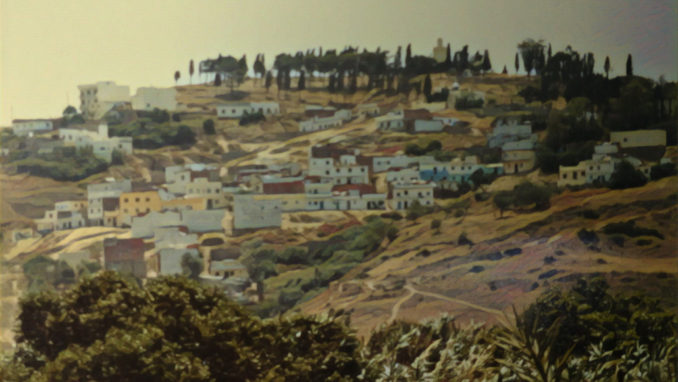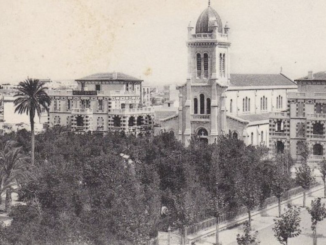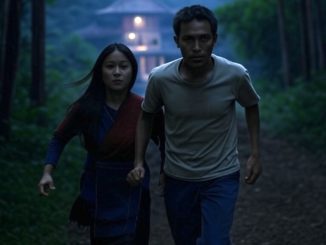
© Always Worth Saying, Going Postal 2020
After breakfast, myself and Tammy addressed the world beyond the comfort of the Royal Maroc Hotel. We were rewarded by being mobbed, pulled at and tugged. They wanted to take us to shops, the Casbah, their uncle’s, a better hotel. We were yelled at and perused through the streets, as per the previous night. A second napkin was deployed, this time around Tammy’s face, complimenting the one around her hair. Although disguising her as if a local Muslim woman, her blue eyes still showed. The numbers in pursuit reduced only slightly.
I bought a fez from a stall. Unconvincing, but it lowered the numbers a little more. While I was doing that, Tammy was haggling over a newspaper. Craftily, it was printed in Russian. Tucking it under my arm, it acted as a further deterrent. The numbers thinned. We slipped into a shop and bought an ashtray, on condition that we were allowed to leave via the back door which led to a narrow alleyway. All of this helped, but we were still being followed, albeit by a small and persistent trickle of hustlers (who spoke a few words of Russian).
Admitting partial defeat, Tammy asked, “Should we buy some cigarettes and walk the coast?”
Wandering to the countryside, away from the city, around the magnificent crescent bay of Tangier, killed the posse completely. It was quite a hike, the heat was oppressive, but it was worth it. Away from the narrow streets, we stumbled into sand and a string of coastal villages. We crossed the path of a camel train. A row of dromedaries, loaded and tied together, were being led through the low scrub.
Square, white-walled houses ran up a hillside to a copse of pine trees from which emerged a white tower, squared at the top. A rounded ornamentation was perched upon it.
“Lighthouse,” I suggested.
“For the top of a hill? Mosque and graveyard,” Tammy decided unconvincingly.
Whatever it was, it was silhouetted against a strangely white sky.
Rather than a road down from the top, there was a sprawl of sandy tracks passing through small bushes. The village consisted of one and two-story high houses, whitewashed, with square black windows and flat roofs. Roofs for hanging washing across and, although not visible at this distance, for preparing food on open-air grills, next to dry sinks and jugs of water. Some dwellings were still construction sites. A world under threat from an invasion of bags of cement and wooden scaffolding poles, we would enjoy it while we could. Tangiers was massing in all directions, trampling coast and desert before it. Away from habitation, most of what could be seen was sand or thin, near sand-coloured, grass.
We were approached by children, boys in swimming trunks, asking for cigarettes and coins, wanting to practice a few words of English, insisting upon having their photos taken. Tammy talked to them. I stood to one side overhearing her Arabic and French. She parted with the cigarettes and palmed off our new, but unwanted, ashtray.
After the children had run off, it was time for us to swim. With nothing on the beach for privacy, we undressed a short distance inland, at the start of the vegetation. Tammy revealed her black swimsuit. I stripped down to my boxer shorts. We placed our clothes into separate folded piles. She tucked the super special secret camera into the middle of hers, as if to keep it out of the sun and dust, rather than to make it impossible to find.
“Aren’t you terrified it gets stolen?” I asked.
She laughed. She would tell me something, on condition that I didn’t report it to anyone, ever.
“Don’t even tell your new friend Emile over a sweaty night beside the bidet.”
This far around the coast, the beach was deserted. The sand itself was pure, golden and scorching hot. A blistering heat greeted our bare feet as we trotted towards the sea.
“Like the camera? It gets stolen? I buy a new one from a camera shop, even in Tangiers.”
I asked her to explain.
“It’s an ordinary mass-produced camera, with a ghost in the machine.”
Reaching the Med, it was noticeably cooler, but still as bright, the sky still that strange white colour. We paddled, ankle-deep in the brine. She told me about “hidden by ubiquity”. The cameras were made by the millions. It was all in the silicon chips. There were lots of extra features but only those in the know could unlock them. The sleeping beast came to life in the hands of a trained specialist, also known as “Tammy”.
“The Japanese camera companies are in on it? Make them for you?” I asked.
“No, silly, it’s all in the silicone chips, made in America and exported everywhere. Don’t tell, ever.”
She continued, “Imagine every TV in the world was watching the viewers as they watched it. Imagine every phone in the world listened to all of the callers as they listened to each other. That’s what going to happen, with the help of the silicone chip,” she prophesied.
“Saves us a lot of bother I suppose,” I observed.
“Uh-huh,” she agreed. We sat on the wet sand with our feet in the water. Tangier was to the left, beaches as if all the way to the Nile were on our right. Europe was ahead but over the horizon, all of Africa lay behind our pale but reddening shoulders.
“Saves a lot of creeping about, spying, gossip, mind-reading,” I observed, slightly melancholily, aware that I might be out of a job.
“Yup,” she agreed. “Everything out in the open. Won’t it be neat? Watch and listen to everybody through their own appliances, then intervene. It’ll happen.”
“They say there’s a computer revolution,” she continued. “It’s an eavesdropping revolution. Thank goodness. Imagine if we found out about all the bad things that were being planned and then could stop them before they happened. Would be good, like God and His angels preventing evil.”
She rested her head onto my shoulder. Like Siamese twins, we also touched at the hips and knees. Putting her hand on my thigh, I put my hand on top of hers and squeezed it. I wasn’t fooled, she wanted to know something. Until a mind-reading silicon chip was deployed in every swimsuit and pair of boxer shorts, she would have to continue to play cute and handsy.
I obliged.
“Last time I had a hand on my knee, I was about to be chased around the room by one of my superiors. Do you have Carry On films over there? Does Sid James run Barbara Windsor around a cardboard Roman villa in prime time?”
“Like Benny Hill?” She asked.
“Same kind of thing,” I observed.
Very close to the start of my service, I’d been invited to a social at a very senior official’s apartment, near my own lodgings in Dolphin Square. I found that I was the only other guest. After a couple of glasses of wine, the big boss turned into a human octopus and started chasing me around the room. Fortunately, the phone rang and kept on ringing. The wire attaching it to the wall ended the pursuit. While catching my breath, bereft of the silicone chip, I could but hear one side of the conversation.
“Sounded as though someone had tried to kill themselves, so it all became a bit sombre. I mouthed to the old perv, ‘I’d better be going’ and crept out of the place. Walked very briskly back to my own rooms.”
“Your luck’s going,” she warned me. “We’re developing wireless telephony, cordless cell phones, work on microwaves.”
“Will it listen in on everybody all of the time, even while they’re being groped by a wierdo?”
“Oh sure, kinda the whole point.” She became more serious, “Did you challenge that behaviour, Worth? There does seem to be an English very senior thing. Kind of why we’re here.”
She emphasised the words as if this were a well-known set of symptoms, as yet without a cure.
I was lying on my back by now, looking at the white North African sky. Hot sand massaged my back, the ocean my legs. By now Tammy was propped up on an elbow beside me, making eyes at me, rubbing my chest with a hand. I knew it wouldn’t last, she was after something, literally massaging the information out of me.
“I complained about him by not complaining.”
“That’s the thing Worth, all these impenetrable euphemisms. Why don’t you guys just say what you mean?”
“That’s how we do thing’s in England.”
“Unsuccessfully,” she interrupted.
“Mentioned it to a few people anecdotally, avoided him, despite him being my boss, ignored the next invitation or three. Million-dollar harassment lawsuits are a bit vulgar.”
“And?” she inquired, her hand straying towards my stomach.
“And they sent me to Northern Ireland.”
“Oh, kinda kills the subplot,” she noted. “Were they trying to get you killed too?”
“No, just keep me out of the way for a while. Until everybody sort of forgot.”
She rolled on top of me and sat up. Straddling me, she gently played a drum tune on my chest with her fists.
“Tell me more,” she demanded.
I wondered what to say? I’d tell her about Williams.
“Remember my dowdy colleague Williams? She kept herself plain to avoid attention. Same kind of thing kept on happening to her. She made herself invisible with the straight hair, granny’s makeup and dull clothes. When the politicians went over the heads of our bosses and the Minister told us about operation Swaling, she was tasked with the London side of things and I was sent over here. I suppose we were the obvious choices.”
Tammy stood, held out a hand and pulled me up.
“Let’s swim,” she announced.
We ran along the edge of the ocean, slowly allowing the water to deepen around our legs. When it was up to our waists we had to cling to each other. Being bounced about by the waves, our feet leaving the sand, she put both of her arms around my neck, I put both of mine around her bottom. As well as being rougher than it looked, the swell was noisier too. I shouted to her as we embraced.
“What did those Arab boys say? Was it worth a packet of cigarettes and an ashtray?”
She yelled back, “You bet, hear this.”
To be continued….
The Goodnight Vienna Audio file
Audio Player



